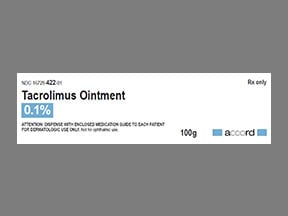My prescription
Edit
100GM of 0.1%, Tacrolimus (1 Tube)
Select pharmacy

CVS
$87.37
COUPON PRICE
Walgreens
$110.30
COUPON PRICE
Albertsons
$113.39
COUPON PRICE
Walmart
$218.27
COUPON PRICETacrolimus savings card
Show this card to your pharmacist
CVS
$87.37
BIN
ID
PCN
GRP
011867
LHEADEADD0
HT
LABH001
Powered by
More prescriptions for organ transplant
More prescriptions for organ transplant
Price history for Prograf (brand) & Tacrolimus (generic)
1 Tube, 100GM of 0.1%
Average retail price for Prograf
Average retail price for Tacrolimus
Average SaveHealth price for Tacrolimus
Our price history data is based on aggregated prescription data collected from participating pharmacies in America. Our prescription data updates daily to reflect the latest price changes. If you notice a missing data point, it means there wasn't sufficient data available to generate a monetary value for that date.
We analyzed Tacrolimus prices for (100GM of 0.1%, 1 Tube) over the last 12 months. The average retail price was $1065.67, while the average price using the SaveHealth discount card was $132.35. That's a savings of approximately 87.58% when using our Tacrolimus coupon.
Compared to the generic version, Prograf had an average price of $4378.50 over the same time period. With the SaveHealth savings card, Tacrolimus is 96.98% cheaper on average than Prograf.
*Retail prices are based on pharmacy claims data, and may not be accurate when we don't have enough claims.
Tacrolimus dosage forms
Dosage Quantity Price from Per unit 100GM of 0.1% 1 Tube $87.46 $87.46 100GM of 0.1% 2 Tubes $148.62 $74.31 100GM of 0.1% 3 Tubes $209.78 $69.93 100GM of 0.03% 1 Tube $87.46 $87.46 100GM of 0.03% 2 Tubes $148.62 $74.31 100GM of 0.03% 3 Tubes $209.78 $69.93
| Dosage | Quantity | Price from | Per unit |
|---|---|---|---|
| 100GM of 0.1% | 1 Tube | $87.46 | $87.46 |
| 100GM of 0.1% | 2 Tubes | $148.62 | $74.31 |
| 100GM of 0.1% | 3 Tubes | $209.78 | $69.93 |
| 100GM of 0.03% | 1 Tube | $87.46 | $87.46 |
| 100GM of 0.03% | 2 Tubes | $148.62 | $74.31 |
| 100GM of 0.03% | 3 Tubes | $209.78 | $69.93 |

